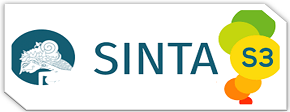Perceived Organizational Support for employee creativity: The mediating role of Knowledge Sharing
DOI:
https://doi.org/10.30587/jurnalmanajerial.v11i02.7508Keywords:
Perceived, Organizational, support, knowledge, sharing, employeeAbstract
Background - Perceived organizational support influences employee commitment, productivity, satisfaction, and intention, this research concentrates on how perceived organizational support affects employee creativity.
Research purposes - Examine the relationship between perceived organizational support and employee creativity as mediated by knowledge sharing.
Design/ Methodology/ Approach - We report the results of a questionnaire survey of a sample of 139 professional employees working in the IT industry in Semarang.
Results and Discussion - Our findings based on path analysis indicate that knowledge sharing mediates the relationship between perceived organizational support and employee creativity.
Conclusion - Employees who feel perceived organizational support will encourage more employee knowledge sharing and creativity than employees with low levels of perceived organizational support.
Research implications - We contribute to knowledge by proposing an overall theoretical background on organizational support theory and a job demands–resources model by incorporating social exchange theory.
Research limitations - This research does not look at it from an organizational perspective; just from an employee's perspective.
References
Akhter, N., Ijaz, M., Siddiqi, U. I., Shouqat, U., & Raza, A. (2016). Impact of Compensation Discrimination on Employees Performance in Engro Food Limited, Alhamd Food Limited and Leader industry Sahiwal of Pakistan. International Review of Management and Business Research, ISSN: 2306-9007, 5(2), 547–560. https://doi.org/2306-9007
Blau, P. M. (1964). Justice in social exchange. Sociological inquiry, 34(2), 193-206.
Cabrera, E. F. & Cabrera, A. (2005). Fostering knowledge sharing through people management practices. The International Journal of Human Resource Management, 16(5), 720-735.
Coyle-Shapiro, J. A., & Conway, N. (2005). Exchange relationships: Examining psychological contracts and perceived organizational support. Journal of applied psychology, 90(4), 774.
Cropanzano, R., & Mitchell, M. S. (2005). Social exchange theory: An interdisciplinary review. Journal of Management, 31(6), 874–900. https://doi: 10.1177/0149206305279602.
Cropanzano, R., Anthony, E. L., Daniels, S. R., & Hall, A. V. (2017). Social exchange theory: A critical review with theoretical remedies. The Academy of Management Annals, 11(1), 479–516. https://doi.org/10.5465/annals.2015.0099.
De Clercq, D., & Pereira, R. (2020). Knowledge-sharing efforts and employee creative behavior: the invigorating roles of passion for work, time sufficiency and procedural justice. Journal of Knowledge Management, 24(5), 1131–1155. https:// doi.org/10.1108/JKM-06-2019-0274
Dewi A., Sagitasari. 2010. “Hubungan antara Kreativitas dan Gaya Belajar dengan Prestasi Belajar Matematika SMP”. Skripsi. Yogyakarta: FMIPA, Universitas Negeri Yogyakarta
Eisenberger, R., Stinglhamber, F., Vandenberghe, C., Sucharski, I. L., & Rhoades, L. (2002). Perceived supervisory support: contributions to perceived organizational support and employee retention. Journal of Applied Psychology.
Homans, G. C. (1961). The humanities and the social sciences. American Behavioral Scientist, 4(8), 3-6.
Hsiu-Fen Lin (2007), Knowledge Sharing and Firm Innovation capability: An Emperical Study. International Journal of Manpower. Vol.29 No.34
Ibrahim, H. I., Isa, A., & Shahbudin, A. S. M. (2016). Organizational Support And Creativity: The Role Of Developmental Experiences As A Moderator. Procedia Economics And Finance, 35, 509–514. Https://Doi.Org/10.1016/S2212-5671(16)00063-0
Jacobson. (2006). An Evaluation of Knowledge and Gaps Related to Impacts of Freshwater and Mareine Aquaculture on the Aquatic Environment. Canada. EVS Environment Consultants.
Kim, W., & Park, J. (2017). Examining structural relationships between work engagement, organizational procedural justice, knowledge sharing, and innovative work behavior for sustainable organizations. Sustainability (Switzerland), 9(2), 205-219. https://doi.org/10.3390/su9020205
Kreitner, Robert dan Angelo Kinicki. 2014. Perilaku Organisasi. Edisi 9. Buku 1. Jakarta: Salemba Empat.
Krishnan, J., & Mary S. V. (2012). Perceived organizational support- An overview on its antecedents and consequences. International Journal of Multidisciplinary Research, 2(4). Di akses dari https://www.researchgate.net/publication/265946420.
Pan, W., Sun, L., & Lam, L. (2020). Employee–organization exchange and employee creativity: A motivational
Pinnington, A. H., & Hammersley, G. (1997). Quality circles under the new deal at Land-Rover. Employee Relations, 19(5), 415–429. https://doi.org/10.1108/01425459710186304
Pinnington, A. H., & Haslop, D. (1995). Team leader autonomy in new product development. Management Decision, 33(3), 5–11. https://doi.org/10.1108/00251749510098928 perspective. The International Journal of Human Resource Management, 31(3), 385–407. https://doi.org/10.1080/09585192.2017.1331368.
Rhoades, L., & Eisenberger, R. (2002). Perceived organizational support: a review of the literature. Journal of applied psychology, 87(4), 698.
Robbins, Stephen P & Judge, Timothy A. 2007. Organizational Behaviour, 12thEdition. Pearson Education, Inc., New Jersey
Robbins, S. P., & Judge, T. A. 2017. Perilaku organisasi (Edisi 12). Salemba Empat.
Shalley, C. E., & Gilson, L. L. (2004). What leaders need to know: A review of social and contextual factors that can foster or hinder creativity. The Leadership Quarterly, 15(1), 33–53. https://doi.org/10.1016/j.leaqua.2003.12.004
Su, W., Lyu, B., Chen, H., & Zhang, Y. (2020). How does servant leadership influence employees' service innovative behavior? The roles of intrinsic motivation and identification with the leader. Baltic Journal of Management, 15(4), pp. 571–586. https://doi.org/10.1108/BJM-09-2.019-0335.
Suifan, T. S., Abdallah, A. B., & Al Janini, M. (2018). The impact of transformational leadership on employees’ creativity. Management Research Review, 41(1), 113–132. https://doi.org/10.1108/MRR-02-2017-0032.
Tsachouridi, I., & Nikandrou, I. (2018). Integrating social comparisons into perceived organisational support (POS): The construct of relative perceived organisational support (RPOS) and its relationship with POS, identification and employee outcomes. Applied Psychology, 68(2), 276–310. https://doi.org/10.1111/apps.12161.
Waileruny, H. T. (2014). Perceived Organizational Support , Job Satistaction Dan Organizational Citizenship Behavior Pada Pt . Bank Maluku Cabang. Agora, 2(2), 1–9
Zaitouni, M., & Ouakouak, M. L. (2018). Key predictors of individual creativity in a Middle Eastern culture: The case of service organizations. International Journal of Organizational Analysis, 26(1), 19– 42. https://doi.org/10.1108/IJOA-03-2017-1139.






























 P-ISSN: 2354-8592 __ E-ISSN: 2621-5055
P-ISSN: 2354-8592 __ E-ISSN: 2621-5055 
